A love letter to civil society

OMAR MOHAMMED
IN 2009, I pretended to understand what civil society was. Even worse, I pretended to know about the legacy of the people behind the Cropper Foundation, the civil-society organisation I interviewed with right after finishing my undergraduate degree at UWI, St Augustine.
In hindsight, I should have done a course in drama, because I played the part so well that I got the job. Let’s be honest, when you’re fresh out of university you're just desperate for anything that pays.
To say that my now 12-plus years at the foundation have been the most formative of my life would be like saying that meat doesn’t belong in doubles – it’s self-evident. I had the privilege of learning from brilliant minds like Angela Cropper and Norman Girvan, who sparked my internal dialogue about what it means to be Caribbean.
Just a few months after I started, the foundation celebrated its tenth anniversary and Angela, in writing about the ethos of the foundation, noted that to her and her husband John, “...giving back is not a luxury; it is a responsibility.” That phrase has stayed with me, giving language to values I’d long observed in my own family and now see almost daily while working in civil society.
A few weeks ago, I attended an event where a government minister referred to the sector that has nurtured me as "uncivil society." It was part of a joke, after which – happily, I might add – he called for the inclusion of these (un)civil-society organisations in a new state policy framework.
I raised an eyebrow as I sat in my slightly wrinkled linen shirt, sans jacket and tie, among a sea of suits. I couldn’t help but wonder what was so "uncivil" about the responsibility of giving back today.
To be frank, if we think times are tough now, without civil society’s self-imposed responsibility to give back we’d be in an even deeper, darker hole. Imagine a world without civil-society organisations – perhaps it’s something we’ve never stopped to consider.
They exist to give us the tools to imagine and achieve our best selves; like the Adult Literacy Tutors Association (ALTA), which has delivered adult literacy classes to tens of thousands of people in TT.
They exist to mend the holes in our social security and safety nets, providing literally life-saving help and support to the most vulnerable among us; like CAISO: Sex and Gender Justice, whose Wholeness and Justice programme offers a safe haven for members of the queer community.
They exist to pull off the masks of duplicity from those accountable to the people of this country; like Fishermen and Friends of the Sea, who use the legal system to protect the natural environment for the benefit of us all.
They exist to tell our stories; like the Bocas Literary Festival, which fosters conversations about Caribbean identity, history and culture through the lens of literature.
They exist to inform policies and introduce innovative solutions to social, economic and environmental challenges.
For the past six years, I’ve been honoured to lead the Cropper Foundation in doing just that. I’ve been fortunate to apply my own "purposeful naiveté" to this work, where I foolishly assume that we all want to work together for the common good. And luckily, thus far, it hasn’t been a foolish assumption.
Our work has always been and continues to be based on authentic collaboration, building on Angela and John Cropper’s core belief that the foundation should be a space that facilitates and encourages others to act on their responsibility to give back.
We’ve successfully brought together partners from civil society, the state, the private sector and beyond to address issues like food security, inclusion and diversity, technology, biodiversity loss, social accountability, and more.
This spirit of collaboration has been a hallmark I’ve witnessed across the civil-society sector. It reflects a deep conviction that we possess the imagination, resources and passion to solve the problems that plague us. As Sunity Maharaj said in 2012, “Every day, every night, people are meeting the length and breadth of this place, trying to figure things out, understand their responsibility to the next generation, and to collaborate in designing solutions. None of this is new.”
However, while those of us in civil society continue to act on our responsibility to give back, we do not have the luxury of resting comfortably. Civic space is closing around the world, and though we may not face the violence and repression as our counterparts in regions like Latin America and the Middle East, we must stand firm in ensuring that our independence, autonomy and freedom are not silently and purposefully eroded.
In an election year, more than ever, we must hold power to account. In a world facing compounding ecological and social crises, we simply do not have the time.
Nevertheless – and this is for my civil-society colleagues – we must also hold space for one another and give ourselves the grace not always to be everything to everyone. Let us continue to embrace collaboration and partnership as we continue to shine a light in the ever-encroaching darkness.
As I transition out of the foundation to play a more active role in the global pushback against the erosion of human rights, I give thanks to those who have inspired and taught me – Angela Cropper, Colin Robinson, Sunity Maharaj, Keisha Garcia, Gillian Goddard, Colleen Davis, Sapphire Alexander and so many more.
This is my love letter to civil society: what we do is worth doing. And if that’s considered "uncivil," then so be it. Who vex, loss.

Comments
"A love letter to civil society"